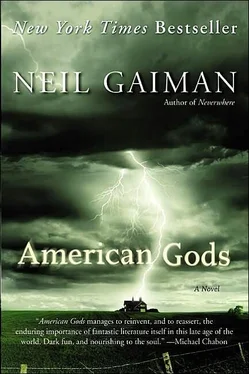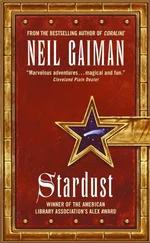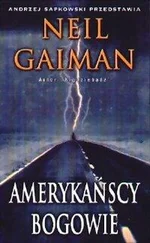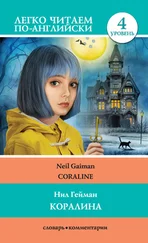* * *
They came to Lookout Mountain from all across the United States. They were not tourists. They came by car and they came by plane and by bus and by railroad and on foot. Some of them flew—they flew low, and they flew only in the dark of the night. Several of them traveled their own ways beneath the earth. Many of them hitchhiked, cadging rides from nervous motorists or from truck drivers. Those who had cars or trucks would see the ones who had not walking beside the roads or at rest stations and in diners on the way, and, recognizing them for what they were, would offer them rides.
They arrived dust-stained and weary at the foot of Lookout Mountain. Looking up to the heights of the tree-covered slope they could see, or imagine that they could see, the paths and gardens and waterfall of Rock City.
They started arriving early in the morning. A second wave of them arrived at dusk. And for several days they simply kept coming.
A battered U-Haul truck pulled up, disgorging several travel-weary vila and rusalka, their makeup smudged, runs in their stockings, their expressions heavy-lidded and tired.
In a clump of trees at the bottom of the hill, an elderly wampyr offered a Marlboro to a naked apelike creature covered with a tangle of orange fur. It accepted graciously, and they smoked in silence, side by side.
A Toyota Previa pulled over by the side of the road, and seven Chinese men and women got out of it. They looked, above all, clean, and they wore the kind of dark suits that, in some countries, are worn by minor government officials. One of them carried a clipboard, and he checked the inventory as they unloaded large golf bags from the back of the car: the bags contained ornate swords with lacquer handles, and carved sticks, and mirrors. The weapons were distributed, checked off, signed for.
A once-famous comedian, believed to have died in the 1920s, climbed out of his rusting car and proceeded to remove his clothing: his legs were goat legs, and his tail was short and goatish.
Four Mexicans arrived, all smiles, their hair black and very shiny: they passed among themselves a bottle that they kept out of sight in a brown paper bag, its contents a bitter mixture of powdered chocolate, liquor, and blood.
A small, dark-bearded man with a dusty black derby on his head, curling payess at his temples, and a ragged fringed prayer shawl came to them walking across the fields. He was several feet in front of his companion, who was twice his height and was the blank gray color of good Polish clay: the word inscribed on his forehead meant truth.
They kept coming. A cab drew up and several Rakshasas, the demons of the Indian subcontinent, climbed out and milled around, staring at the people at the bottom of the hill without speaking, until they found Mama-ji, her eyes closed, her lips moving in prayer. She was the only thing here that was familiar to them, but still, they hesitated to approach her, remembering old battles. Her hands rubbed the necklace of skulls about her neck. Her brown skin became slowly black, the glassy black of jet, of obsidian: her lips curled and her long white teeth were very sharp. She opened all her eyes, beckoned the Rakshasas to her, and greeted them as she would have greeted her own children.
The storms of the last few days, to the north and the east, had done nothing to ease the feeling of pressure and discomfort in the air. Local weather forecasters had begun to warn of cells that might spawn tornados, of high-pressure areas that did not move. It was warm by day there, but the nights were cold.
They clumped together in informal companies, banding together sometimes by nationality, by race, by temperament, even by species. They looked apprehensive. They looked tired.
Some of them were talking. There was laughter, on occasion, but it was muted and sporadic. Six-packs of beer were handed around.
Several local men and women came walking over the meadows, their bodies moving in unfamiliar ways: their voices, when they spoke, were the voices of the Loa who rode them: a tall black man spoke in the voice of Papa Legba who opens the gates; while Baron Samedi, the voudon lord of death, had taken over the body of a teenage goth girl from Chattanooga, possibly because she possessed her own black silk top hat, which sat on her dark hair at a jaunty angle. She spoke in the Baron’s own deep voice, smoked a cigar of enormous size, and commanded three of the Gede, the Loa of the dead. The Gede inhabited the bodies of three middle-aged brothers. They carried shotguns and told jokes of such astounding filthiness that only they were willing to laugh at them, which they did, raucously.
Two ageless Chickamauga women, in oil-stained blue jeans and battered leather jackets, walked around, watching the people and the preparations for battle. Sometimes they pointed and shook their heads. They did not intend to take part in the coming conflict.
The moon swelled and rose in the east, a day away from full. It seemed half as big as the sky, as it rose, a deep reddish-orange, immediately above the hills. As it crossed the sky it seemed to shrink and pale until it hung high in the sky like a lantern. There were so many of them waiting there, in the moonlight, at the foot of Lookout Mountain.
* * *
Laura was thirsty.
Sometimes living people burned steadily in her mind like candles and sometimes they flamed like torches. It made them easy to avoid, and it made them easy, on occasion, to find. Shadow had burned so strangely, with his own light, up on that tree. She had chided him once, when they had walked and held hands, for not being alive. She had hoped, then, to see a spark of raw emotion. To have seen anything.
She remembered walking beside him, wishing that he could understand what she was trying to say.
But dying on the tree, Shadow had been utterly alive. She had watched him as the life had faded, and he had been focused and real. And he had asked her to stay with him, to stay the whole night. He had forgiven her…perhaps he had forgiven her. It did not matter. He had changed; that was all she knew.
Shadow had told her to go to the farmhouse, that they would give her water to drink there. There were no lights burning in the farm building, and she could feel nobody at home. But he had told her that they would care for her. She pushed against the door of the farmhouse and it opened, rusty hinges protesting the whole while.
Something moved in her left lung, something that pushed and squirmed and made her cough.
She found herself in a narrow hallway, her way almost blocked by a tall and dusty piano. The inside of the building smelled of old damp. She squeezed past the piano, pushed open a door and found herself in a dilapidated drawing room, filled with ramshackle furniture. An oil lamp burned on the mantelpiece. There was a coal fire burning in the fireplace beneath it, although she had neither seen nor smelled smoke outside the house. The coal fire did nothing to lift the chill she felt in that room, although, Laura was willing to concede, that might not be the fault of the room.
Death hurt Laura, although the hurt consisted mostly of things that were not there: a parching thirst that drained every cell of her, an absence of heat in her bones that was absolute. Sometimes she would catch herself wondering whether the crisp and crackling flames of a pyre would warm her, or the soft brown blanket of the earth; whether the cold sea would quench her thirst…
The room, she realized, was not empty.
Three women sat on, an elderly couch, as if they had come as a matched set in some peculiar artistic exhibition. The couch was upholstered in threadbare velvet, a faded brown that might, once, a hundred years ago, have been a bright canary yellow. They followed her with their eyes as she entered the room, and they said nothing.
Читать дальше









